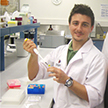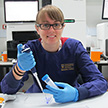Related Questions
- How often do scientists find new diseases?
- If you could prevent a scientific discovery from the past what would it be?
- what is the most exciting discovery you have made in your area of work
- So far how much research have you uncovered concerning cardiovascular diseases?
- where do you start when it comes to finding a cure for a disease









There is no real answer to “what was the first known disease” as humans have likely lived with diseases from the beginning, and therefore long before science was around to describe them and understand them as being diseases, rather than curses or whatever they thought made people sick. it is also known thaat the earliest men and women could not write, so there would be no documents to tell us anyway. However, we can look at the oldest documents and see what illnesses people described in the past to work out what they may have had, and we can look at archaeology to tell us what illnesses people suffered and died of thousands of years ago.
Books like the bible describe illnesses such as leprosy, which we know is caused by a bacteria called Mycobacterium leprae, so that has been around causing diseases in humans for a very long time. Leprosy was feared throughout the ancient world and was described by the Egyptians as well. Sufferers were outcasts of society, which although it seems mean, was a way of protecting other people from infection. Around 400 BC, the Athenian physician Hippocrates catalogued the diseases of his world and included a disease which we now know to be cholera, which is a bacteria that spreads through polluted water. A disease that was most likely typhoid (another bacterial disease spread by polluted water) was described by an ancient historian called Thucydides as sweeping through ancient Athens between 430 and 426 BC.
Archaeology has found mummies, or humans that have been preserved when they were buried, with signs of the disease tuberculosis (TB). Researchers took samples from the lung of a mummy that had lung damage and did a DNA test on it. They found that the ancient egyptian from 600BC (600 years before the common era) had died of TB which is still a serious disease today.
Therefore some bacteria have been causing people to suffer for thousands of years and these same culprits are still with us today, though we have much better weapons such as good sanitation and antibiotics to help us. We have to look after our weapons though, by only using antibiotics appropriately and washing our hands to stop the spread of illnesses.
1
There is an on-going debate about the first known disease. From the fossils we can pinpoint some bone abnormalities which are not really “diseases” but medical conditions.
However the very first disease known to humankind must be a bacterial infection as bacteria has been living around long before humans or animals emerged.
1
I agree, it would most likely have been a bacteria or virus. Probably one that existed before people did!
0